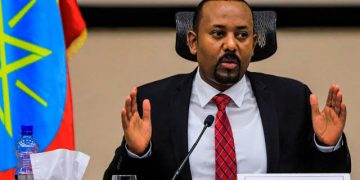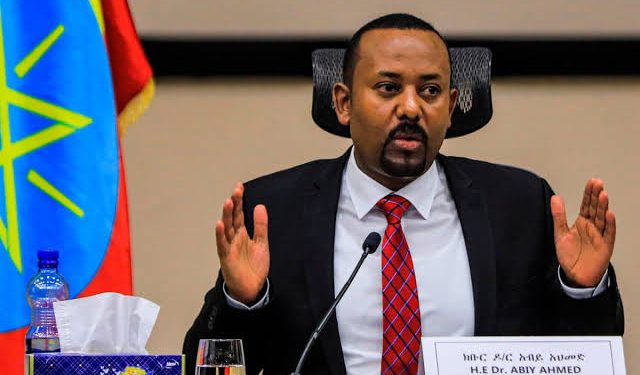The federal government of Ethiopia has come out to clarify on its decision to declare seven UN officials as Persona Non Grata and availed them 72 hours from Thursday to leave the country.
Dina Mufti, the Spokesman for Ethiopia’s Foreign Affairs Ministry, accused the officials in a notice, of meddling into internal affairs of Ethiopia.
“The Ministry of Foreign Affairs has declared ‘persona non-grata’ for seven individuals who have been working for some international NGOs in Ethiopia for meddling in the internal affairs of the country,” the note read.
The listed UN staff include Adele Khodr, the UNCEF country Representative for Ethiopia, Sonny Onyegbule Monitoring, Reporting and Advocacy Team Leader for the UN Office of High Commissioner for Human Rights and Kwesi Sansculotte, the Peace and Development Advisor for the UN Office for the Coordination of Humanitarian Affairs (UNOCHA).
Others declared persona non grata are Saeed Mohamoud Hersi, who has been serving as Deputy Head of Ethiopia Office for UNOCHA, Grant Leaity (Deputy Humanitarian Coordinator for UNOCHA in Ethiopia), Ghada Eltahir Mudawi (Acting Deputy Humanitarian Coordinator for UNOCHA) and Marcy Vigoda (Coordinator for Humanitarian Affairs).
Mufti did not on Thursday delve into details regarding the exact nature of meddling, but on Friday evening, the Ministry of Foreign Affairs revealed in a statement that the officials were expelled for taking sides in the ongoing conflict in Tigray as well as aiding the war.
Tigray is one of the 10 regions of Ethiopia found in the northern part of the country. For more than two years now, its people including children and elderly have suffered all forms of abuse from killings, displacement and rape, all violations orchestrated by the Tigray People’s Liberation Front (TPLF), an organization designated as terrorist group by the country’s parliament.
The group brutally ruled Ethiopia for 27 years from 1991 before being forced out of power after massive nationwide protests that saw Prime Minister Abiy Ahmed assume the country’s leadership in 2018. But angered by the unexpected loss of the disproportionate influence and undue privilege they enjoyed while in power, TPLF leaders retreated to Tigray and declared war against Abiy’s government. They have since engaged in activities aimed at toppling him including the unprovoked violent attack on Federal forces in November last year that sparked the current crisis.
TPLF has rejected and undermined most efforts by government to restore normalcy including unilateral ceasefire declared in June this year and negotiations led by elders sent to Tigray by Abiy-led government.
Meanwhile, government welcomed humanitarian aid agencies in Tigray to provide life-saving humanitarian assistance to the affected people, and a Memorandum of Understanding (MoU) on Enhanced Coordination Mechanism for Humanitarian Access in the Tigray Regional State with UN agencies was signed.
Now, according to the Ethiopian government, the staff declared persona non grata abused the signed MoU.
“In connection to the current situation in the northern part of Ethiopia, we had sadly observed that some UN staff have failed to fulfill their mission independently and impartially in accordance with the above-mentioned MoU and the relevant principles of the UN,” reads the statement in part.
The Ethiopian government says the decision was a measure of last resort after bringing the violations to the attention of the relevant UN high officials but no change was realized.
“Despite these communications of concern, the grave violations persisted. As such, as a measure of last resort, the government of Ethiopia had to ask some officials of the UN agencies leave the country,” adds the statement.
Government explains that the seven individuals were involved in the diversion of humanitarian assistance to TPLF, transfer of communication equipment to be used by TPLF and violated the agreed-upon security arrangements.
They are also blamed for the continued reticence in demandeering the return of the more than 400 trucks commanded by TPLF for military mobilisation and for the transportation of its forces since July 2021.
They are further accused of disseminating misinformation and politicization of humanitarian assistance.
Government has expressed disappointment in the fact that some countries are urging the UN Security Council to consider this matter.
“This is a blatant violation of Ethiopia’s sovereign prerogative on matters of national security. We are confident the Security Council will reject this undue politicization of humanitarian assistance.”
“Measures taken against individuals not the UN”
Ethiopia has dismissed claims that by effecting the expulsion, it is stopping activities of the UN and blocking humanitarian access in Tigray.
“Taking sovereign measures against specific individuals within an institution need not be construed as barring the operations of the entity. Individuals within international organizations cannot be above reproach because this is Africa. Expecting they are, is no less than entitlement,” says Billene Seyoum, the spokesperson of the office of Ethiopia Prime Minister.
Hopeful about continued provision of humanitarian assistance
Lobbyists and commentators attached to TPLF have since claimed that the decision is to block humanitarian support to reach Tigray, but federal government says the contrary.
“We are confident that the provision of humanitarian assistance will not be affected due to this measure,” says Ethiopian government.
The United Nations in Ethiopia said on September 16 that only 38 out of 466 trucks that entered Tigray since July 12 had returned. Photos of vehicles believed to belong to the UN carrying alleged fighters of the TPLF were recently seen making rounds on social media.
Ethiopia says the limited access to humanitarian support in Tigray is caused by TPLF’s continued attacks on civilians, forced displacement of people, killing of cattle, destruction of economic assets and commandeering of more 400 aid trucks.
It should be remembered that despite the risk involved, the Ethiopian government reduced the number of roadblocks on the road to Tigray from seven to only two with an aim of aiding quick movement of trucks carrying humanitarian aid to the capital Mekelle, and has been supplying some food items to the affected people in Tigray. How then can the same federal government block aid to reach its own people?
UN Secretary General speaks out
The Secretary General of the UN, Antonio Guteress, said in a statement that he was shocked about the information that the Government of Ethiopia had declared seven UN officials, including senior UN humanitarian officials, as persona non grata.
“All UN humanitarian operations are guided by the core principles of humanity, impartiality, neutrality, and independence. In Ethiopia, the UN is delivering lifesaving aid – including food, medicine, water, and sanitation supplies – to people in desperate need. I have full confidence in the UN staff who are in Ethiopia doing this work,” Guteress said.
He added that the UN is committed to helping Ethiopian people who rely on humanitarian assistance.
“We are now engaging with the Government of Ethiopia in the expectation that the concerned UN staff will be allowed to continue their important work,” he adds.
Abiy Ahmed enjoys popular support
When he took power in 2018, Abiy promised to bring the then totally divided country together. He among others released all political prisoners as well as inviting back the exiled Ethiopians to return and build a united country together. This explains why he was accepted by the whole nation.
Over 100 million Ethiopians in other parts of Ethiopia and from within Tigray itself have severally condemned atrocities by the TPLF. In July, dozens of thousands of Ethiopians gathered in Addis Ababa’s Meskel square to show support for the country’s military in its fight against them.
Many with placards, the demonstrators heaped praise on Prime Minister, Abiy Ahmed as well as the national army. They matched to the square as they sung songs of liberation and calling for the international community including media to desist from engaging into the internal management of Ethiopia.











